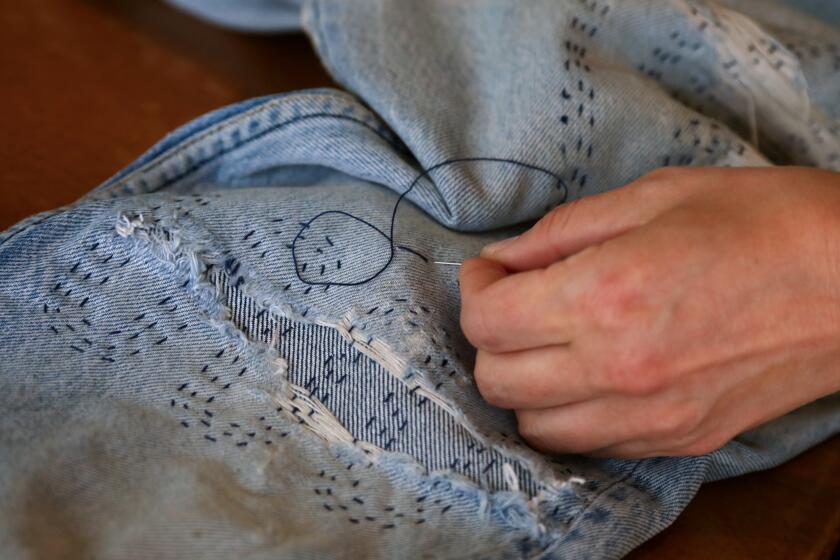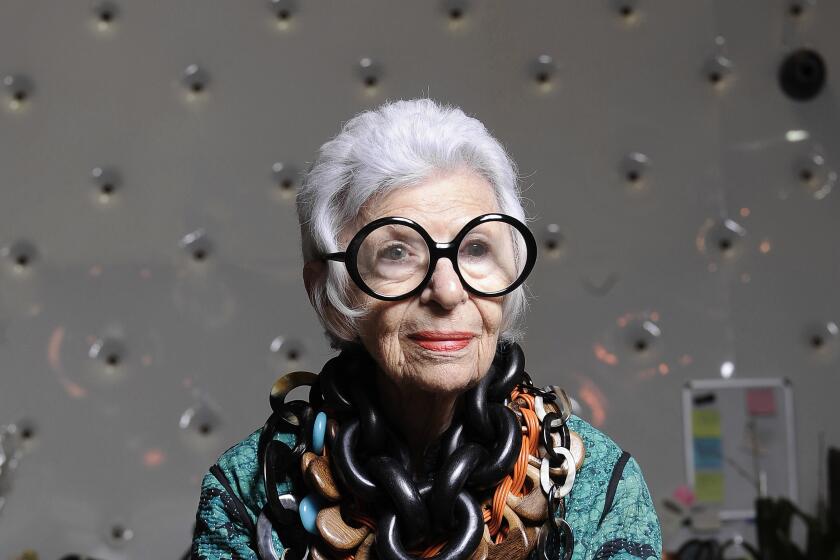Little Designing a Return to Fashion
Her old company is bankrupt, she’s knee-deep in messy litigation, and she has lost the rights to her own name. But Los Angeles designer Carole Little is preparing a return to the fashion scene.
Little and her longtime business partner and ex-husband, Leonard Rabinowitz, are planning a September launch of a design studio to sell Little’s creative talent to apparel manufacturers. Called Studio CL, the stripped-down venture marks the pair’s first project since their clothing company collapsed last year under a pile of debt after an ill-fated merger.
The implosion of that entity--Chorus Line Corp.--has triggered a spate of lawsuits, with Little and Rabinowitz, investors, financiers and former employees all claiming they were victims. But the most noticeable casualty for consumers is the Carole Little trademark itself. The line of better women’s sportswear and career apparel hasn’t been produced since last fall, and the label now is owned by creditors who have yet to find a buyer to make them whole.
Little concedes that prospects appear slim for working out a financial deal to regain control of her namesake brand. But if the Studio CL concept proves successful, her signature fashions may soon be back on retail racks, even though the labels will not bear her moniker.
“It’s frustrating not to control your own name,” Little said. “But I’m looking forward to doing what I love best . . . and putting that other stuff behind me.”
That may not be so easy. Even by the rough-and-tumble standards of the fashion business, the fallout from Chorus Line’s destruction isn’t pretty.
The company was formed by the July 2000 merger of two struggling companies: Chorus Line, a maker of moderately priced sportswear controlled by Beverly Hills investment firm Levine Leichtman Capital Partners Inc., and Little and Rabinowitz’s California Fashion Industries Inc., which produced the Carole Little and St. Tropez lines. The idea was to revive both firms’ fortunes by combining operations, slashing overhead and offering buyers a wide selection of apparel in several price categories.
The result, according to court records, was “a marriage made in hell.” Just four months after the merger, the firm closed its doors, throwing 300 people out of work. A Chapter 11 bankruptcy petition followed in December. The company since has taken to producing lawsuits instead of clothing.
Everyone involved now claims to be a fashion victim. The principal lender, GMAC Commercial Credit, filed suit seeking $40 million from Levine Leichtman, alleging the investment firm cooked Chorus Line’s books to trick GMAC into bankrolling the merger. Levine Leichtman denies those allegations and has filed a countersuit claiming that California Fashion Industries was the weakest link. It claims GMAC concealed the company’s “bankrupt” financial condition to dupe Levine Leichtman into consenting to a merger, wiping out the money management firm’s $49-million investment in Chorus Line when the new company tanked.
Rabinowitz and Little have filed their own suit against Levine Leichtman, alleging the firm used California Fashion Industries to prop up Chorus Line in order to hide losses from investors. And former employees have sued the merged company and its principals, claiming they are owed back wages, vacation pay and other compensation when the apparel maker abruptly ceased operations in November.
“There is plenty of blame to go around,” said Mark Brutzkus, an attorney for three vendors that pushed Chorus Line Corp. into Bankruptcy Court by filing an involuntary Chapter 7 liquidation petition. The lenders and principals “were all sophisticated business people. It’s the little guys who got burned.”
It’s now up to the courts to sort out the mess. In the meantime, Carole Little clothing hasn’t been on retailers’ shelves for nearly a year--an eternity in the fashion world. The label in effect belongs to GMAC, which has yet to arrange a sale or licensing deal. Little and Rabinowitz said they’ve had some discussion with GMAC, which did not respond to a request for comment. But the pair say they’re prepared to move on without the brand that defined them for nearly 25 years.
“Manufacturers still know who Carole is,” Rabinowitz said. “Providing them with design talent is where we can really add value.”
The pair are currently setting up their 7,000-square-foot studio on San Vicente Boulevard in the Mid- City area. They have hired a couple of support staff members, but their goal is to assemble a team that would include as many as 12 designers and artists to help manufacturers and retailers develop new lines or spruce up old ones.
Will anyone be interested in Carole Little the designer if they can’t brag about it on the label? Absolutely, said Ilse Metchek, executive director of the California Fashion Assn.
Metchek said there are plenty of manufacturers, particularly foreign apparel makers, who know how to make a quality garment but lack the distinctive styling to break through in the American market. And although low-rise jeans, halter tops and other belly-button-revealing junior fashions are currently the rage, Metchek said an aging population favors the enduring styles that have always been Little’s specialty.
“California design talent is a very, very valuable commodity,” Metchek said. “Carole Little has a proven track record. Someone is going to want to buy that creativity.”
For her part, Little said she won’t miss the headaches associated with running a manufacturing operation.
“I always liked it when we were smaller and had control over what we were doing,” Little said. “All I’ve ever cared about is the creative part.”






